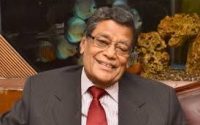$100 Website Offer
Get your personal website + domain for just $100.
Limited Time Offer!
Claim Your Website NowSingle-judge court in Supreme Court disposes 33 cases in a single day
Source:- hindustantimes.com
In an unprecedented situation in the Supreme Court on Monday, a single-judge court heard and disposed 33 cases.
Justice Deepak Gupta held the court alone because his senior colleague – M Shantanagoudar who was to head the bench – was unavailable. Much to the surprise of the advocates and litigants, Justice Gupta held the court on his own.
Attorney General Mukul Rohatgi, present in the court in connection with a land acquisition matter of Telanagana, could not resist from drawing the court’s attention to the unprecedented situation.
“Your Lordship, for the first time during the last 25 years I am seeing single judge sitting and dealing with the cases in Supreme Court,” Rohatgi said. Justice Gupta, however, did not comment.
Sources said that Justice Shantanagoudar apparently reported unwell following which Chief Justice JS Khehar convinced Justice Gupta to hear the 33 cases listed. Most Supreme Court judges are out of the Capital for the summer vacation.
As per the apex court rules a minimum quorum of two judges is required to hear cases. This rule is not there in high courts or trial courts. In HCs a single judge can decide cases.
Before taking up the regular work Justice Gupta also dealt with nearly a dozen “mentioning matters” when advocates bring to the court’s notice important matters and request it to list it for an urgent hearing.
Eight judges including the Chief Justice constituted the first sitting of the SC. However, the Constitution left it to the Parliament to increase the strength. In the early years, all the judges sat together to hear the cases.
But with the increase in workload, Parliament increased the number of judges from 8 in 1950 to 11 in 1956, 14 in 1960, 18 in 1978 and gradually to the present 31 over the past 40 years. Currently there are 27 judges in the Supreme Court.
The constitution of benches also changed and they sat in smaller benches of two and three. Benches comprising larger numbers of five, seven, nine and thirteen judges are constituted when there is a difference of opinion or a constitutional issue is involved.



